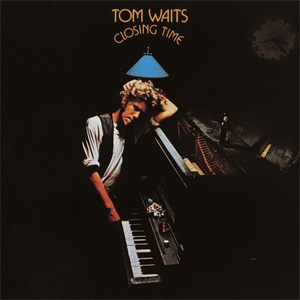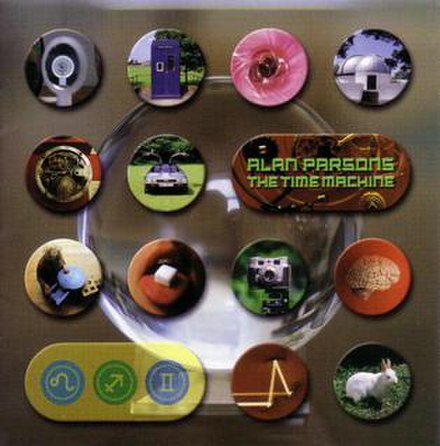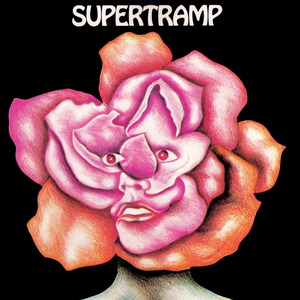Seems 2015 is set to be the year of the discography review, and who am I to buck the trend? Probably wouldn't seem right if I didn't jump aboard this particular bandwagon, much less try to take over driving it! Therefore, let me now bid you welcome to

Insofar as I can, I'm going to try to do these reviews sequentially, which is to say, I don't intend writing, or at least posting, anything in between each discography. Or to put it another way, I'll be reviewing all the albums one after another with no other entries envisioned until the discography is completed. My intention is to probably focus on the studio output only, as it's generally not only difficult but often counterproductive to review live albums, most of the tracks having more than likely being discussed during the reviews of the studio recordings they come from, though I may occasionally break that rule. Any albums which have been already reviewed will be linked to, as there's no point in my repeating myself.
As already mentioned, briefly, I'll be looking into the careers and reviewing all the albums of three of my favourite artistes, two being of course Genesis and their modern-day counterpart Marillion (shut up Frownland!)

but first, a man whose music I would never have envisioned myself liking, or even listening to, and for which I am indebted to my younger brother, who got me into his music.

Thomas Alan “Tom” Waits is a native of California. He was born there and he still lives there, though of course his musical career and life have taken him far and wide over nearly forty-five years. I'm not going to write a bio of him: if you've never heard him the chances are you've heard his songs sung by someone else, but if you really want to read about him, here :
Tom Waits - Wikipedia, the free encyclopedia
Without ever a single hit to his name, and though his albums are revered in many circles they are hardly what you'd call massive sellers, Waits has charted a course through music which has seen him earn the admiration of everyone from Springsteen to Crystal Gayle and The Eagles to Rod Stewart. Many people have had hit singles with his music, and it's been featured on both the big and small screen. Having recently celebrated his sixty-sixth birthday, he's still going strong and released an album in 2013, which surely is not the last we'll hear from him. His style is varied: he uses elements of blues, folk, jazz, vaudeville, island music, soul and rock, as well as other, less recognised music forms, and the number of instruments he employs is hard to determine, as he tends to often make his own, like banging chair legs on the floor or hitting pots and pans together.
But though he has wandered happily through such areas as experimental, jazz and folk music, Waits's music career began in a much more sedate manner, as his debut album, a quiet, understated affair that even then hinted at greatness to come, shows us. And this, of course, is where we begin our descent into the often madcap, exilhirating, sometimes frightening and frequently baffling, but always wonderful world of Tom Waits.
 Closing time --- 1973 (Asylum)
Closing time --- 1973 (Asylum)
With characteristic laconic wit, Waits chooses words associated with endings for his beginning, and indeed there is also there the connotations linked with the pub and the tavern, which would become his shelter and his keeper for several years as he spiralled into an ever-worsening descent into alcoholism and abuse. There is nothing of the experimental work that would colour his later material here, but then, he was only twenty-four, and had yet to discover all the darkness the world had to offer. Even so, this doesn't read as an album written by a wide-eyed optimist or someone with their head in the clouds. As we'll see, Waits's feet were always firmly planted on the ground, if perhaps too often swinging from a barstool.
Counting in the song, and indeed marking the moment when, to all intents and purposes, his recording career began, its “One, two, three, four” as a song The Eagles would filch for their “On the border” album, a situation of Waits would later growl “The Eagles ain't Country. There's no s
hit on their boots!” kicks the album off. A slow, lazy piano which would become something of Waits's trademark sound takes “Ol' 55” in, and it is very Country in feel and shape. You can see why Frey amd Henley wanted it. But even as this could be seen as an ode to the car, (I'm not sure which one but I'm sure Big3 or some American will enlighten me) it is in fact used merely as a metaphor for escape, perhaps unwilling escape. When Waits sings
”Just a-wishin' I had stayed a little longer” you get the feeling he would rather have been back with his lover than riding away in his car, but there's a feeling of inevitablity about it, a sense that all things come to an end, and when that happens, it's good to have a means of escape, perhaps even a getaway car.
It's a low-key, downbeat opening to the album, and it doesn't get much more upbeat really for much of it. Even at that, it's a bitterly lovely song as he growls
”The sun's comin' up/ I'm ridin' with lady Luck/ Freeways cars and trucks.” There are some nice touches on the guitar but mostly it's very much a piano driven song, though I think that may be a celeste or a harmonium on the chorus; certainly both are used on the album. Another slow, bitter ballad then in “I hope that I don't fall in love with you”, this time an acoustic guitar song, as Waits fears falling for a woman he has met, knowing the pitfalls of romance.
”Had a beer and now I hear/ You callin' out for me” he drawls as
" I wonder if I should offer you a chair?” It's the first example of a song that Waits would use to twist and warp the idea of a ballad, making love a dirty word and something to be avoided. In the end though, he capitulates as he sighs
”I think that I just/ Fell in love with you.” The song also contains the title of the album, although it does finish with a song so titled, an instrumental.
The first time the album takes an upswing it kicks off on the slow, lazy bass of Bill Plummer, then the piano evokes a kind of drunken stagger as lonely trumpet from Delbert Bennett keeps its lonely vigil. “Virginia Avenue” is one of a number of songs which would reference local areas and places Waits knew of, frequented or visited, enshrining them forever in his music. Fun fact: this song also appears on “The Early Years Vol 1” where it is slightly different. Where he sings
”What's a poor boy to do?” the original line is
”What's a poor sailor to do?” Thought you'd like to know. I'll remind you when we get to that album's review. Interesting look forward to the future too when he sings
”Blues I leave behind me/ Catchin' up on me.”
His first song not to include the title in the lyric, “Old shoes (and picture postcards)” is also one of a selection of titles which would have footnotes in parentheses. A jaunty but yet slow acoustic guitar ballad with a lot of folk in it, it relates the decision to leave someone after what would appear to have been a long relationship. He sings
”So long, farewell/ The road calls me dear/ And your tears cannot bind me anymore.” One of the strengths of this album is that none of the songs are too long. Most come in around the three-minute mark, with one or two edging over four and one almost five, but that's the longest. It's just enough time to appreciate the song, let it sink in before it vanishes like an echo in your brain. Waits was, and is, a master of the art of using brevity. You'll find no ten-minute compositions in his music.
I've mentioned in the series “The Word according to Waits” that another feature of his songs is that they usually concern or are built around characters, characters who are inevitably flawed. The man who leaves his clingy lover in the above song, the guy who walks along Virginia Avenue looking for a bar and of course the fellow who hops into his “Ol' 55” and hightails it out of town. These characters and personages make his songs more real somehow, and for me at any rate have enabled them to speak to me; not that I know anything about being drunk and wandering the streets at 3am (!), but the very flaws of his characters, their shortcomings is in my view what makes them real, and relatable, and that much more powerful for being pathetic. We can identify with them. We know them, or someone like them. Perhaps we are, or were, them. But we see through their eyes and hear through their ears, and the world we see is a different one than our own eyes show us. It's a damp, squalid, dark, threatening and unforgiving one, where every shadow could contain an attacker, or someone wanting to rob us of our bottle, and every friend must be searched for a knife, just in case. The milk of human kindness has soured for these people, if it was ever fresh, and as we journey on with them through Waits's albums we will get to know the world they inhabit.
Another thing Waits would often do is build his songs around nursery rhymes, or incorporate parts of them in the lyric, as here, when “Midnight lullaby” begins with the words
”Sing a song of sixpence/ A pocket full of rye”. Acoustic piano is attended by trumpet as the song moves along on a nice, swaying sort of rhythm, and Waits muses
”When you are dreaming/ You see for miles and miles.” The song ends with a piano rendition of “Hush little baby”, another nod to the world of children's stories and rhymes, appropriate as this appears to concern him talking to his child.
I don't want to rag on him on his first outing, but for me this is where the album's quality begins to dip slightly. I do like “Martha”, but I feel the piano is a little harsh here, though the cello from Jesse Ehrlich in the chorus certainly saves the song. Still, I regard it as one of the weaker tracks on the album, despite the reflective nature of the song as a guy telephones his old lover out of the blue to recall the old times. It also ends badly, I feel. “Rosie” then is another piano-driven track, though the piano is much softer and gentler this time. The melody is a little reminiscent of “Virginia Avenue” and returns to the Country feel of “ol' 55” with some fine pedal steel from Peter Klimes, and the subject matter is somewhat similar, then what I would call a lower grade trio of songs comes to a shuddering end with “Lonely”.
Possibly, in my estimation, one of Waits's worst early songs, it's again driven by piano, but the vocal this time I find very harsh, and the lyric mostly consists of the title. It just seems like something that, were there other tracks considered for and dropped from the album, should have joined them. I really don't like this song, and it's seldom I would skip any Waits song but I often do jump over this one. Luckily the album then rallies strongly, as if eager to throw off the somewhat cloying influence of the last three tracks, as “Ice cream man” is only the second upbeat track, where Waits first reveals his wicked sense of humour. Sexual innuendo follows sexual innuendo as he smirks
”Got a big stick momma/ That'll blow your mind” and goes on to assure the lady
”When you're tired and you're hungry/ And you want something cool/ Got something better than a swimmin' pool!” There's a boppy, jazzy, almost big band rhythm driven by some fine basswork and soaring guitar. He even starts and ends the song with the sound of an ice cream van's chimes! Oh Waits, you devil!
And we're back on track. “Little trip to Heaven (on the wings of your love)” is a fine laidback ballad with smooth trumpet and flowing piano, its melody recalling in part “Midnight lullaby”, Bennet really excelling here on the brass. “Grapefruit moon” is the final vocal track, piano again taking centre stage with some very prominent bass, some of the runs on the piano again nodding back to “Virginia Avenue”, and indeed presaging the later “On the nickel”, and Ehrlich returns to add some lovely cello. Waits echoes the thoughts of us all on certain songs when he sings
”Every time I hear that melody/ Something breaks inside” before a beautiful duet between piano and cello sets the seal on a sumptuous almost-closer. We end then on the title track, and only instrumental, the only words being a muttered “This is for posterity” from Waits at the beginning. The tune is taken by a lazy, almost reflective piano and some lovely harmonica, taking us out in fine style and bringing the album to a soft and relaxing close.
TRACKLISTING
1. Ol' 55
2. I hope that I don't fall in love with you
3. Virginia Avenue
4. Old shoes (and picture postcards)
5. Midnight lullaby
6. Martha
7. Rosie
8. Lonely
9. Ice cream man
10. Little trip to heaven (on the wings of your love)
11. Grapefruit moon
12. Closing time
Some debut albums set the charts on fire, some receive critical acclaim, and some just vanish like ripples in a pond. But still waters run deep, and though this initial effort from Tom Waits did not exactly make headline news across the world and introduce a star, he had made his mark quietly and almost unobtrusively, and while the world may not have been watching and listening, the music fraternity was. As mentioned, The Eagles, making their name at this time, were impressed enough by the new songwriter to cover one of his songs, and later Bette Midler herself would cover “Martha”, while Meat Loaf would put a rendition of the same song on his 1995 album.
As time went on, Waits became the go-to guy, the musician's musician, and his refusal to go with the flow, his willingness, even eagerness to buck trends --- he once said “I slept through the sixties” --- would mark him as both a maverick and a stone cold music genius, as well as often one of the only honest musicians left in a world of synthpop, X-Factor and sell-outs. His trademark gravelly voice was as yet still to develop, and would only really come into its own on his third album, “Small change”, when he would really come to the attention of everyone. Taken as an album in its own right, this is a pleasant, if often bitter, country/folk outing, with some extremely clever at time lyrics. But beyond that, it was setting down a marker, a new singer/songwriter honing his considerable talent and placing his bet down on the table, a bet that would pretty much always reap him large and profitable dividends, at least musically if not always financially.
“Closing time” made one simple but undeniable statement: Tom Waits had arrived.





















 Linear Mode
Linear Mode
